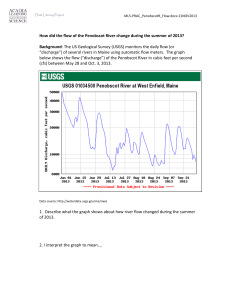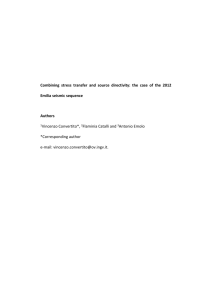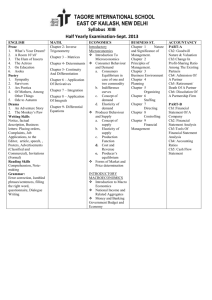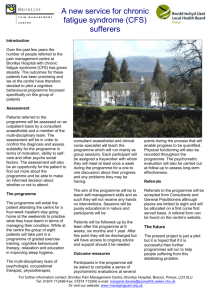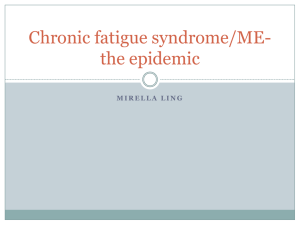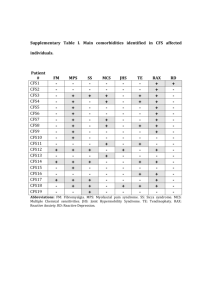Dr Ian Gibson letter
advertisement
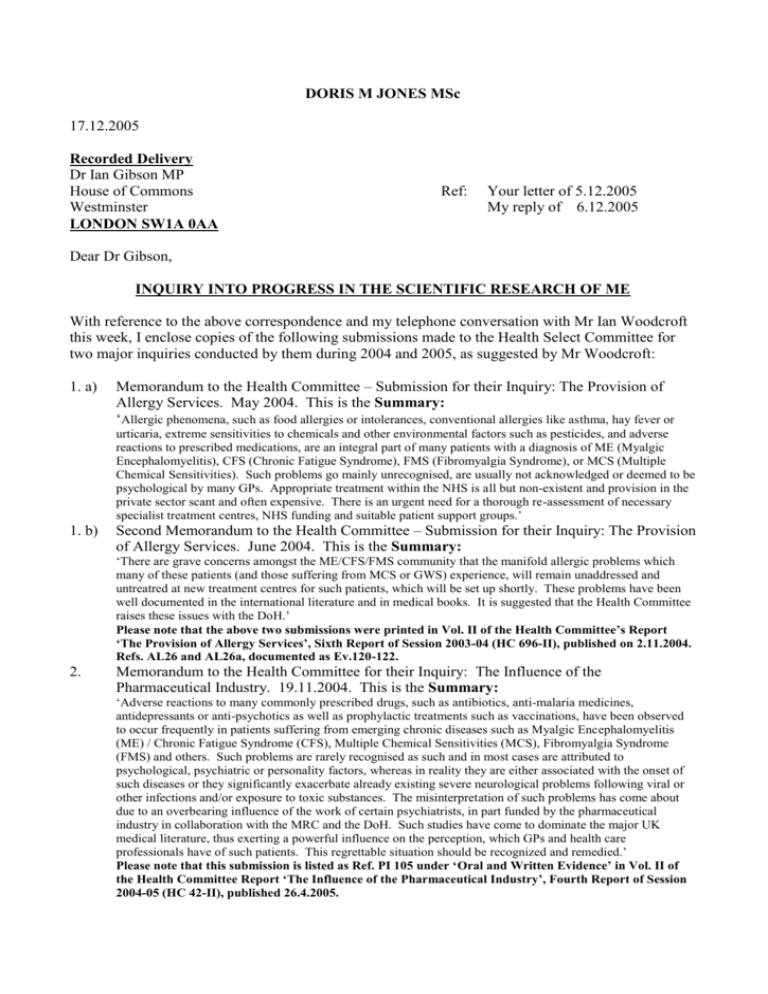
DORIS M JONES MSc 17.12.2005 Recorded Delivery Dr Ian Gibson MP House of Commons Westminster LONDON SW1A 0AA Ref: Your letter of 5.12.2005 My reply of 6.12.2005 Dear Dr Gibson, INQUIRY INTO PROGRESS IN THE SCIENTIFIC RESEARCH OF ME With reference to the above correspondence and my telephone conversation with Mr Ian Woodcroft this week, I enclose copies of the following submissions made to the Health Select Committee for two major inquiries conducted by them during 2004 and 2005, as suggested by Mr Woodcroft: 1. a) Memorandum to the Health Committee – Submission for their Inquiry: The Provision of Allergy Services. May 2004. This is the Summary: ‘Allergic phenomena, such as food allergies or intolerances, conventional allergies like asthma, hay fever or urticaria, extreme sensitivities to chemicals and other environmental factors such as pesticides, and adverse reactions to prescribed medications, are an integral part of many patients with a diagnosis of ME (Myalgic Encephalomyelitis), CFS (Chronic Fatigue Syndrome), FMS (Fibromyalgia Syndrome), or MCS (Multiple Chemical Sensitivities). Such problems go mainly unrecognised, are usually not acknowledged or deemed to be psychological by many GPs. Appropriate treatment within the NHS is all but non-existent and provision in the private sector scant and often expensive. There is an urgent need for a thorough re-assessment of necessary specialist treatment centres, NHS funding and suitable patient support groups.’ 1. b) Second Memorandum to the Health Committee – Submission for their Inquiry: The Provision of Allergy Services. June 2004. This is the Summary: ‘There are grave concerns amongst the ME/CFS/FMS community that the manifold allergic problems which many of these patients (and those suffering from MCS or GWS) experience, will remain unaddressed and untreatred at new treatment centres for such patients, which will be set up shortly. These problems have been well documented in the international literature and in medical books. It is suggested that the Health Committee raises these issues with the DoH.’ Please note that the above two submissions were printed in Vol. II of the Health Committee’s Report ‘The Provision of Allergy Services’, Sixth Report of Session 2003-04 (HC 696-II), published on 2.11.2004. Refs. AL26 and AL26a, documented as Ev.120-122. 2. Memorandum to the Health Committee for their Inquiry: The Influence of the Pharmaceutical Industry. 19.11.2004. This is the Summary: ‘Adverse reactions to many commonly prescribed drugs, such as antibiotics, anti-malaria medicines, antidepressants or anti-psychotics as well as prophylactic treatments such as vaccinations, have been observed to occur frequently in patients suffering from emerging chronic diseases such as Myalgic Encephalomyelitis (ME) / Chronic Fatigue Syndrome (CFS), Multiple Chemical Sensitivities (MCS), Fibromyalgia Syndrome (FMS) and others. Such problems are rarely recognised as such and in most cases are attributed to psychological, psychiatric or personality factors, whereas in reality they are either associated with the onset of such diseases or they significantly exacerbate already existing severe neurological problems following viral or other infections and/or exposure to toxic substances. The misinterpretation of such problems has come about due to an overbearing influence of the work of certain psychiatrists, in part funded by the pharmaceutical industry in collaboration with the MRC and the DoH. Such studies have come to dominate the major UK medical literature, thus exerting a powerful influence on the perception, which GPs and health care professionals have of such patients. This regrettable situation should be recognized and remedied.’ Please note that this submission is listed as Ref. PI 105 under ‘Oral and Written Evidence’ in Vol. II of the Health Committee Report ‘The Influence of the Pharmaceutical Industry’, Fourth Report of Session 2004-05 (HC 42-II), published 26.4.2005. Details set out in these memoranda explain some of many real problems experienced by patients suffering from ME/CFS or PVFS (and similarly by patients with FMS and/or MCS – there is much overlap in these conditions). They are part of a wider spectrum of a multitude of physical problems, which are very similar though not necessarily identical, but in their entirety represent the profile of the controversial and highly complex diseases referred to as ‘ME/CFS’. They also give a brief overview of the historical background and underlying reasons for the many problems experienced by them in obtaining appropriate and effective treatment. Due to personal involvement – my son developed ME in 1980 aged 12 ½ - I have since 1989 done a number of studies on patients with such diagnoses. The principal purpose of these studies was to try to elucidate factors associated with the onset and development of these syndromes, which may then facilitate more focused biomedical research. This hopefully would identify the underlying physiological malfunctions that result in the multitude of health problems, which these patients experience. The following studies have been done since 1989: 1. A large multifactorial study on 225 ME patients (including a group of 68 students with ME) and 73 control group 2. 3. 4. 5. 6. subjects. Factors looked at were: many symptoms before and after onset of the disease, detailed history relating to 5 years prior to onset of the syndrome, including previous infections, medications (including immunisations), stress experiences, dietary and other lifestyle details, as well as precipitating factors. Limited data were also obtained on a separate group of young people with ME. Subjects were recruited through the two major UK ME charities and local groups. Results were shown in two poster presentations at the International Conference on CFS, Dublin, in 1994 and elsewhere. Financial support was provided by one UK ME charity to attend the Dublin conference. Two separate studies on ME/CFS patients (70 in total), who attributed the development and/or onset of their health problems to the use of the antibiotic Septrin / Bactrim (generic name Cotrimoxazole) or Trimethoprim. Results of the first of these studies were shown at the First World Congress on CFS and Related Disorders, Brussels, in November 1995, and the second at the Second World Congress on CFS and Related Disorders, Brussels, in September 1999 – both as poster presentations. The abstract of the first of these studies was published in the Journal of Chronic Fatigue Syndrome, 1996, Vol.2+3, p151-153. A separate study on 78 MCS patients (most of whom were also given a diagnosis of ME/CFS or PVFS). Some results of this study were shown at the Second World Congress on CFS and Related Disorders, Brussels, September 1999, likewise as a poster presentation. A long-term Follow-up Survey on all these subjects was carried out for the CMO’s Working Group on CFS/ME in 2001. Results of details obtained on 174 of these patients were submitted to the Working Group in April 2001. In addition summary results were compiled of 4 independently conducted surveys (including my own) for the CMO’s Working Group, on a total of 3074 ME/CFS patients. Precis of Submissions to the CFS/ME Working Group were presented at the Fatigue 2002 Conference, London, in May 2002 as a poster presentation. Abstracts or Summary details of the above studies and surveys will be given in a further submission for your Group on Scientific Research into ME by 16th January 2006. Regrettably all these details, along with a great deal of other information on international research, which was likewise submitted to the CMO’s Working Group on CFS/ME (and the MRC), were – to all intents and purposes – comprehensively ignored. All these studies, apart from the long-term Follow-up Survey, for which I received some financial support from the 25% ME Group, were done without any financial help. I trust the above information is of interest and use to your Group. Yours sincerely, Doris M Jones Independent Researcher and Writer Ex Reference Group Member to the CMO’s Working Group on CFS/ME Carer of a patient with ME for over 25 years
